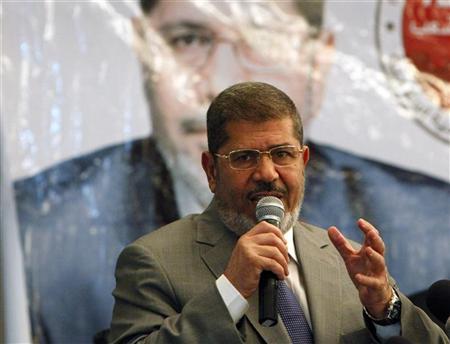Latest NEWS
- Aswat Masriya, the last word
- Roundup of Egypt's press headlines on March 15, 2017
- Roundup of Egypt's press headlines on March 14, 2017
- Former Egyptian President Hosni Mubarak to be released: lawyer
- Roundup of Egypt's press headlines on March 13, 2017
- Egypt's capital set to grow by half a million in 2017
- Egypt's wheat reserves to double with start of harvest -supply min
- Roundup of Egypt's press headlines on March 12, 2017
Foes of Egypt's Islamist president spurn dialogue offer

Egyptian President Mohamed Mursi - Asmaa Waguih/REUTERS
By Edmund Blair
CAIRO, Dec 7 (Reuters) - Egyptian opposition leaders rejected a national dialogue on Friday that had been proposed by the Islamist president as a way out of a crisis that has polarised the nation and provoked deadly clashes in the streets.
Opponents of Mohamed Mursi, the first elected head of state in Egypt's history, staged more street protests in Cairo, while his supporters in the Muslim Brotherhood held emotional funerals for six of the movement's members killed in fighting around the presidential palace earlier in the week.
Mursi had offered few concessions in a speech late on Thursday, refusing to retract a Nov. 22 decree in which he assumed sweeping powers or cancel a referendum next week on a constitution newly drafted by an Islamist-dominated assembly.
Instead, he called for a dialogue at his office on Saturday to chart a way forward for Egypt after the referendum, an idea that liberal, leftist and other opposition leaders rebuffed.
They have demanded that Mursi rescind the decree in which he temporarily shielded his decisions from judicial review and postpone the Dec. 15 referendum before any negotiations begin.
A leader of the main opposition coalition said it would not join Mursi's dialogue: "The National Salvation Front is not taking part in the dialogue," said Ahmed Said, a leader of the coalition, who also heads the liberal Free Egyptians Party.
The Front's coordinator, Mohamed ElBaradei, a Nobel peace laureate, urged "national forces" to shun what he called an offer based on "arm-twisting and imposition of a fait accompli".
Mursi's decree giving himself extra powers sparked the worst political crisis since he took office in June and set off renewed unrest that is dimming Egypt's hopes of stability and economic recovery after nearly two years of turmoil following the overthrow of veteran military strongman Hosni Mubarak.
It has exposed deeply contrasting visions for Egypt since the Arab Spring of revolution, one held by Islamists, who for decades were oppressed by the army and shut out of politics, and another by their rivals, who fear religious conservatives want to squeeze out opposing voices and restrict social freedoms.
"RED CARD"
Hundreds of protesters gathered in Cairo's Tahrir square in response to calls by the April 6 movement, which played a prominent role in igniting last year's revolt. It wants to show Mursi a "red card", using a soccer metaphor for his dismissal.
Elsewhere, thousands of Islamists gathered at Cairo's al-Azhar mosque for the funeral of "martyrs" killed in the clashes. "Our souls and blood, we sacrifice to Islam," they chanted.
U.S. President Barack Obama told Mursi on Thursday of his "deep concern" about casualties in this week's clashes, in which seven people were killed and 350 wounded. Obama said "dialogue should occur without preconditions", the White House said.
The upheaval in the most populous Arab nation worries the United States, which has given billions of dollars in military and other aid since Egypt made peace with Israel in 1979.
Ayman Mohamed, 29, among a few protesters near the presidential palace, ringed with tanks and armoured vehicles after violence that peaked there on Wednesday night, said Mursi should scrap the draft constitution and heed popular demands.
"He is the president of the republic. He can't just work for the Muslim Brotherhood," Mohamed said of the eight-decade-old Islamist movement that propelled Mursi from obscurity to power.
Said, the leader of the Free Egyptians Party, accused Mursi of ignoring all the opposition's demands in his "shocking" speech on Thursday and of fixing the dialogue agenda in advance.
The conflict between Islamists and opponents who each believe the other is twisting the democratic rules to thwart them has poisoned the political atmosphere in Egypt.
"Is this an environment for people to say 'yes' or 'no' to a document that is going to divide them rather than unite them?" Said asked, referring to the planned vote on the constitution.
Voting for Egyptians abroad starts on Saturday, a week before the ballot in the country itself, the Egyptian Foreign Ministry said on its official Facebook page.










